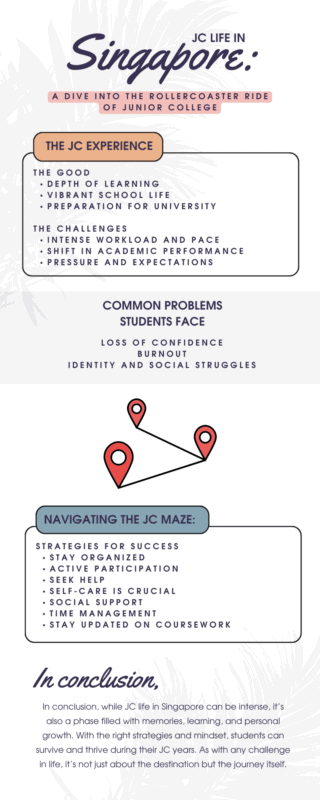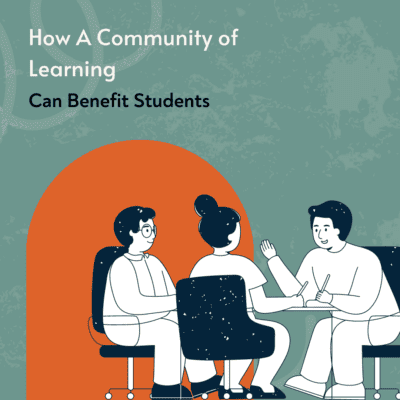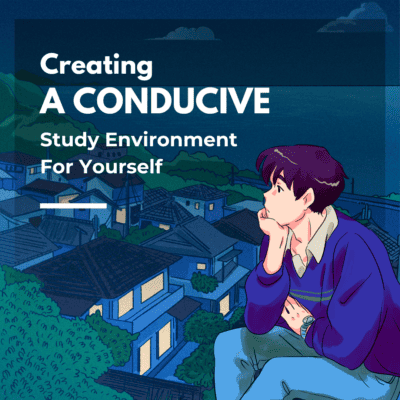Singapore’s education system is renowned for its rigour, and the Junior College (JC) phase stands out as one of its most challenging stages. A natural continuation for Integrated Programme (IP) students and a choice many O-level graduates take, JC serves as a bridge between secondary school and university. Here’s a glimpse into JC life and some strategies students can adopt to navigate this demanding phase.
The JC Experience
1. The Good:
- Depth of Learning: JCs offer an opportunity for students to delve deeper into subjects of their choice, with an advanced curriculum, such as H2 Mathematics, designed to challenge and expand their knowledge, allowing them to dive deep into subjects of their choice. This specialization often prepares students well for university studies.
- Vibrant School Life: Contrary to popular belief, JC isn’t just about hitting the books. There are numerous school events, and the sense of school spirit is unparalleled. Students engage in enriching co-curricular activities, form tight-knit communities, and often remember their JC days as some of the most vibrant of their school life.
- Preparation for University: The syllabus – with mandatory subjects like PW (Project Work) and such – and the rigorous training equip students with essential skills, preparing them for tertiary education and future challenges.
2. The Challenges:
- Intense Workload and Pace: JC is notoriously challenging. The leap from secondary school, even for Integrated Program (IP) students, is significant, often causing distress and anxiety among students. The volume of content in JC is significantly higher, and the pace at which topics are covered can be daunting.
- Shift in Academic Performance: Many students who were top performers in secondary school find themselves struggling with the demands of JC. It’s common for students to experience drops in their grades. The two years fly by swiftly, with little time for students to catch their breath between different exams, projects, and co-curricular activities.
- Pressure and Expectations: The pressure to perform can come from multiple sources: self, family, peers, and society at large. This often leads to stress and anxiety.
Common Problems Students Face
- Loss of Confidence: Even top students in secondary school might find themselves struggling with the JC syllabus. The depth and breadth of subjects, coupled with a fast-paced environment, can be daunting. Given the steep learning curve, many students quickly lose confidence when they can’t keep up with the syllabus or when their grades dip.
- Burnout: Due to the constant flow of assignments such as project work, and tutorials, students often find themselves overwhelmed, leading to burnout.
- Identity and Social Struggles: For some, the transition means leaving old friends behind and forming new social circles, which can be emotionally taxing.
- Time Management: Balancing studies, co-curricular activities, social life, and personal well-being is a juggling act most JC students grapple with.
- Identity and Future Uncertainty: With university and career choices looming, students often face existential angst. Questions about their future path and the kind of adult they want to become can be sources of stress.

Navigating the JC Maze: Strategies for Success
1. Stay Organized: Given the fast-paced nature of JC, staying organized is paramount. Time management is crucial. Using tools like planners, calendars, and to-do lists can help students prioritize and manage their workload.
2. Active Participation: Engage actively in tutorials and lectures. Asking questions and participating in discussions can help in understanding complex topics.
3. Seek Help Academically: If you’re struggling with certain topics, seek help early. This could be from teachers, online resources, tuition, or peers who have a better grasp of the material. If academic subjects are challenging, consider seeking external tutoring. Alternatively, forming study groups can provide peer support and different perspectives on complex topics.
4. Seek Support Emotionally: Be it teachers, school counselors, friends, or family, it’s essential to have a support system. Regular check-ins and open conversations about challenges can provide relief. Surround yourself with supportive friends and family. Do also remember to seek your seniors for great advice! Sharing your challenges and discussing problems can lighten the load and provide new perspectives.
5. Self-care is Crucial: It’s essential to allocate time for relaxation. Whether pursuing a hobby, exercising, or simply taking a walk, find something that helps you destress.
6. Time Management: Allocate specific times for studies, relaxation, social activities and CCAs. Stick to a routine as much as possible.
7. Stay Updated on Coursework: JC isn’t a place for last-minute cramming. Consistent revision and staying updated with coursework can reduce stress during examination periods.
Concluding Thoughts
While JC life in Singapore poses its fair share of challenges, it’s also a period of immense growth and self-discovery. With the right strategies and mindset, students can not only navigate the JC years successfully but also come out of it with cherished memories, invaluable skills, and a clearer sense of direction for the future.





